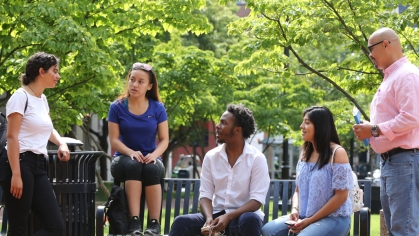Gen Z voters are more politically active than young voters of the past, with the last election garnering the highest turnout among youth in three decades. Young voters of color, a growing demographic, are an especially important group this election cycle. They will account for 40 million eligible voters, one fifth of the electorate.
Diane Wong is an Assistant Professor of Political Science at Rutgers-Newark. She is a researcher for Genforward, a nationally representative survey of young adults housed at the University of Chicago. She is also a scholar with the Sheila Y. Oliver Center for Politics and Race in America at Rutgers-Newark. Drawing from the an August 2024 Genforward Survey, Wong shares the latest data on Gen Z’s top election-year concerns and their style of political engagement.
What issues are most important to young voters overall and how does that differ from the concerns of older voters?
According to the latest Genforward survey, young voters of color overwhelmingly said that the economy was a top priority. Inflation over the last several years has exacerbated the cost of living crisis, impacting virtually every aspect of their lives, from rising grocery and housing costs to deferring important life events like continuing their education and receiving proper health care. Even though inflation is going down, it still is a concern for many young adults. Black and Latinx Gen Zers have been disproportionately impacted by inflation. When asked about their personal financial situation, nearly 82% of Black and 79% of Latinx respondents indicated that they live in financial precarity with little to no emergency savings. Another issue that sets young voters apart from older voters is their stance on Israel’s war on Gaza. Even though young voters overwhelmingly sided with Biden in 2020, one particular issue that has frustrated Gen Z voters is his stance on the war in Gaza. Currently, 34% of Black, 59% of Asian American, and 47% of Latinx young voters disapprove of the way Biden is handling the war in Gaza.
What issues are most important to young Black, Asian and Hispanic voters?
Gen Z voters are not single-issue voters and that besides the economy, other issues like abortion, climate change, gun violence, and student debt will bring young voters to the polls. Genforward data indicates that abortion is an issue that will undoubtedly shape Gen Z voter turnout at the polls. When asked about the Supreme Court decision to overturn federal protections for abortion rights, 61% of Black, 61% of Latinx, 72% of Asian American Gen Z voters expressed strong disagreement. In addition, when asked whether abortion will have an impact on vote choice, 31% of Black, 33% of Latinx, 26% of Asian American, and 36% of white Gen Z voters said that they will only vote for a candidate who shares their views on abortion. Gen Z voters of color want concrete actions and progress made around the issues that matter the most to them, like gun violence, climate change, and student debt cancellation. Gen Z are alarmingly falling behind on credit card debt and loan bills and accumulating debt at a pace not seen since prior to the pandemic. When we asked whether the government should do more to help students pay for college, 64% of Black, 66% of Asian American 58% of Latinx, and 61% of White Gen Z voters agreed or strongly agreed.
Judging from past elections, are young voters today more or less likely to vote?
According to the August 2024 Genforward survey, when asked about their intention to vote in the presidential election, 67% of Black, 68% of Asian American, and 54% of Latinx Gen Z voters expressed plans to vote. The average voter turnout in presidential elections hovers around 60%, so these numbers are higher than the national average. We can also look to two years ago, when young voters had one of the highest turnout rates ever in a midterm election. The 2022 midterm elections recorded the second-highest youth turnout in the past three decades. Their votes were critical in assisting the Democrats hold onto competitive House seats and in electing new candidates like Maxwell Alejandro Frost to Congress as the first Gen Z and Afro Cuban member of the House. As a 25 year old gun reform activist and former March For Our Lives organizer, Frost defeated Republican candidate Calvin Wimbish in Florida.
What are their attitudes toward voting and the election process? Are they more, or less, politically engaged than past generations and what is different about their style of political engagement?
Far from being apathetic, young adults actually have high confidence in the democratic process and in their own power in shaping change. Genforward data indicates that 53% of young adults ages between 18-26 expressed confidence that their votes would be counted accurately. In fact, 47% of Black youth, 46% of Latinx youth, and 64% of Asian American youth expressed confidence that their vote would be counted and valued equally, despite national headlines of election fraud. We have also seen more young adults embrace other forms of political participation that include grassroots campaigns, mutual aid coordination, and other solutions that extend beyond party politics.


